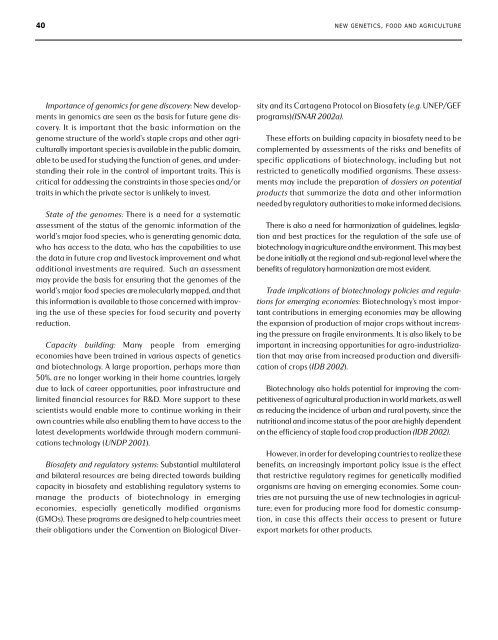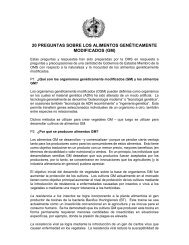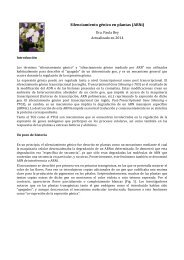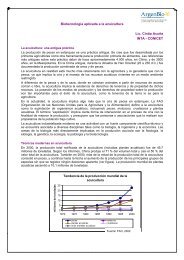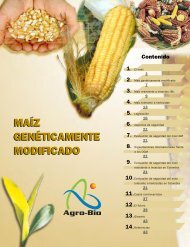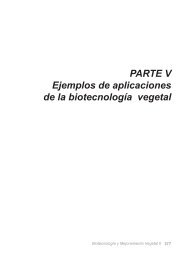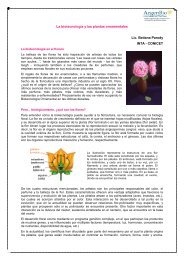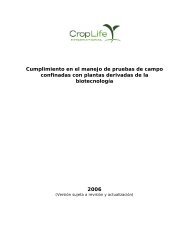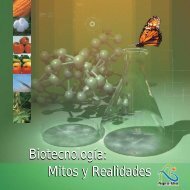New Genetics, Food and Agriculture: Scientific ... - ArgenBio
New Genetics, Food and Agriculture: Scientific ... - ArgenBio
New Genetics, Food and Agriculture: Scientific ... - ArgenBio
You also want an ePaper? Increase the reach of your titles
YUMPU automatically turns print PDFs into web optimized ePapers that Google loves.
40N E W G E N E T I C S, F O O D A N D A G R I C U LT U R EImportance of genomics for gene discovery: <strong>New</strong> developmentsin genomics are seen as the basis for future gene discovery. It is impo r tant th at the basic info r m ation on th egenome structure of the world’s staple crops <strong>and</strong> other agriculturallyimportant species is available in the public domain,able to be used for studying the function of genes, <strong>and</strong> underst<strong>and</strong>ing their role in the co n trol of impo r tant traits. This iscritical for addressing the constraints in those species <strong>and</strong>/ortraits in which the private sector is unlikely to invest.S tate of the genomes: T h e re is a need for a sys te m ati cas s essment of the status of the genomic info r m ation of th eworld’s major food species, who is generating genomic data,who has access to the data, who has the capabilities to usethe data in future crop <strong>and</strong> livestock improvement <strong>and</strong> whata d d i tional inves tments are re q ui red. Such an as s es s m e n tmay provide the basis for ensuring that the genomes of theworld’s major food species are molecularly mapped, <strong>and</strong> thatthis information is available to those concerned with improvingthe use of th ese spe c i es for food secur i ty <strong>and</strong> pove r tyreduction.Ca pa c i ty bui l d i n g : Many pe o ple from emerg i n geconomies have been trained in various aspects of genetics<strong>and</strong> biote c h n ol ogy. A large pro po r tion, perhaps more th an50%, are no longer working in their home countries, la rgelydue to lack of career oppo r tun i ti es, poor infras tr u c ture an dl i m i ted fi n ancial res o urces for R&D. Mo re support to th es es c i e n tists would enable more to co n tinue working in th e i rown countries while also enabling them to have access to thel atest developments wo r l dwide th rough modern co m m un i-cations technology (UNDP 2001).B i o s afe ty <strong>and</strong> reg u l ato ry sy s tems: S u b s tan tial multi l ate ra l<strong>and</strong> bilate ral res o urces are being dire c ted towards bui l d i n gca pa c i ty in biosafe ty <strong>and</strong> es ta bl i shing re g u l ato ry sys tems tom anage the products of biote c h n ol ogy in emerg i n ge co n o m i es, es pecially geneti cally mod i fied org an i s m s(GMOs). These programs are designed to help countries meettheir obligations under the Convention on Biological Diversity<strong>and</strong> its Cartagena Protocol on Biosafety (e.g. UNEP/GEFprograms)(ISNAR 2002a).These efforts on building capacity in biosafety need to beco m pl e m e n ted by as s essments of the risks <strong>and</strong> be n e fits ofs pe c i fic appl i cations of biote c h n ol ogy, including but notres tr i c ted to geneti cally mod i fied org anisms. These as s es s-ments may include the pre paration of d o s s i e rs on po te n ti a lp rodu c t s th at sum m ar i ze the data <strong>and</strong> other info r m ati o nneeded by regulatory authorities to make informed decisions.T h e re is also a need for har m o n i zation of gui d e l i n es, legisl a-tion <strong>and</strong> best pra c ti ces for the re g u l ation of the safe use ofb i o te c h n ol ogy in agr i cu l ture <strong>and</strong> the env i ronment. This may bes tbe done initially at the regional <strong>and</strong> sub-regional level wh e re th ebe n e fits of re g u l ato ry har m o n i zation are most evident.Trade impl i cations of biotec h n ol ogy pol i c i es <strong>and</strong> reg u l a-tions for emerging eco n o m i es : B i o te c h n ol ogy ’s most impo r-tant contributions in emerging economies may be allowingthe expansion of production of major crops without increasingthe pressure on fragile environments. It is also likely to beimportant in increasing opportunities for agro-industrializationthat may arise from increased production <strong>and</strong> diversificationof crops (IDB 2002).B i o te c h n ol ogy also holds po te n tial for improving the co m-pe ti tive n ess of agr i cu l tural produ c tion in world mar ke t s, as we l las re ducing the incidence of ur ban <strong>and</strong> rural pove r ty, since th en utr i tional <strong>and</strong> income status of the poor are highly depe n d e n ton the effi c i e n cy of sta ple food crop produ c tion (IDB 2002).However, in order for developing countries to realize thesebe n e fi t s, an incre asingly impo r tant pol i cy issue is the effe c tth at res tr i c tive re g u l ato ry re g i m es for geneti cally mod i fi e dorganisms are having on emerging economies. Some countriesare not pursuing the use of new technologies in agriculture;even for producing more food for domes tic co n s um p-tion, in case this affects their access to present or futureexport markets for other products.


